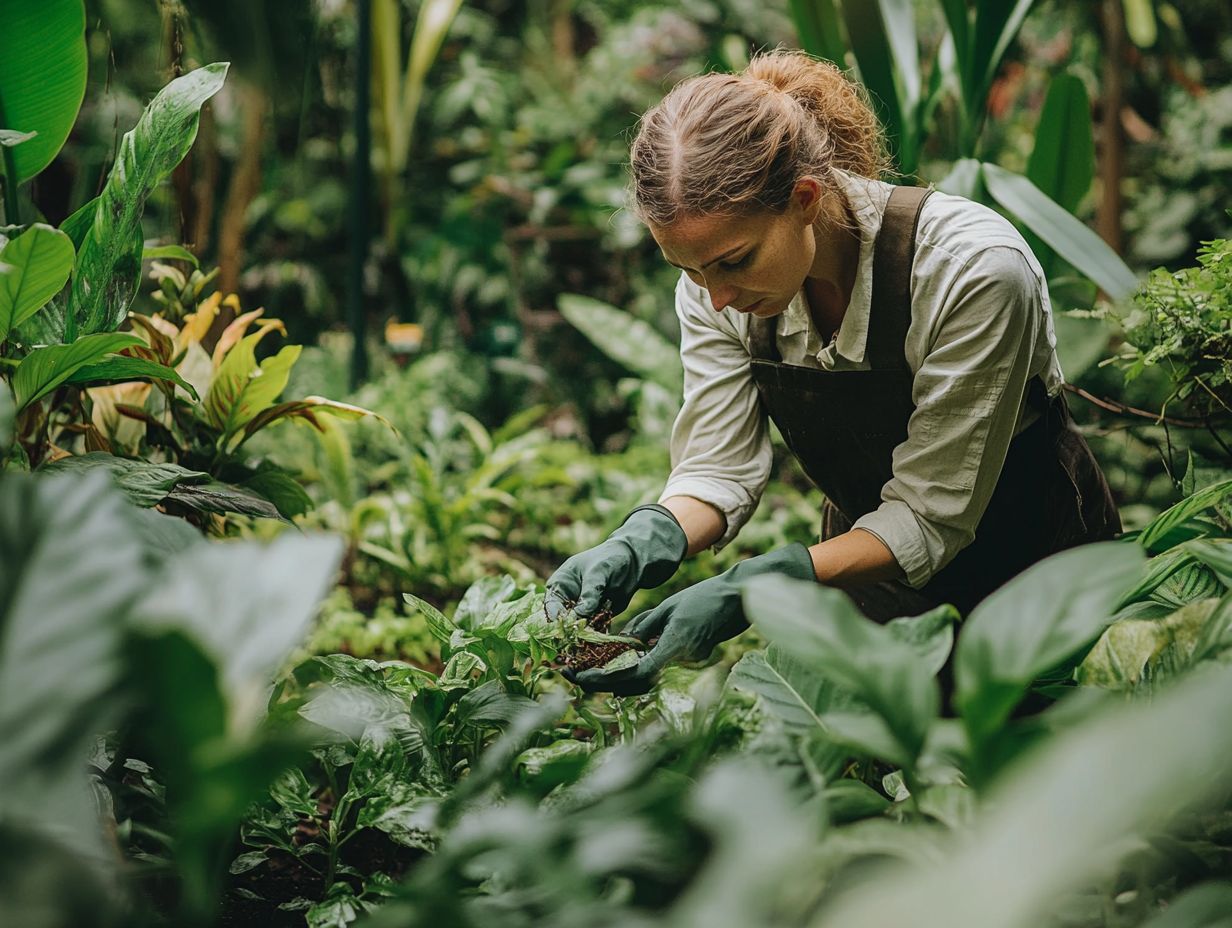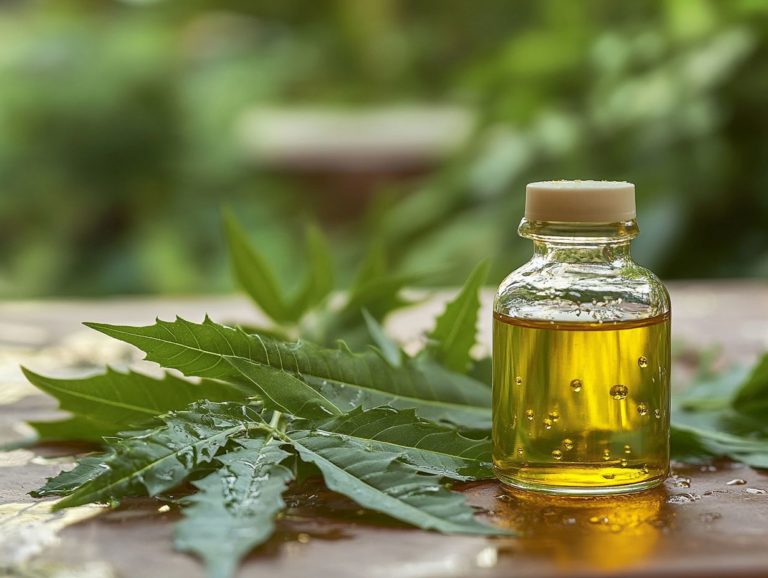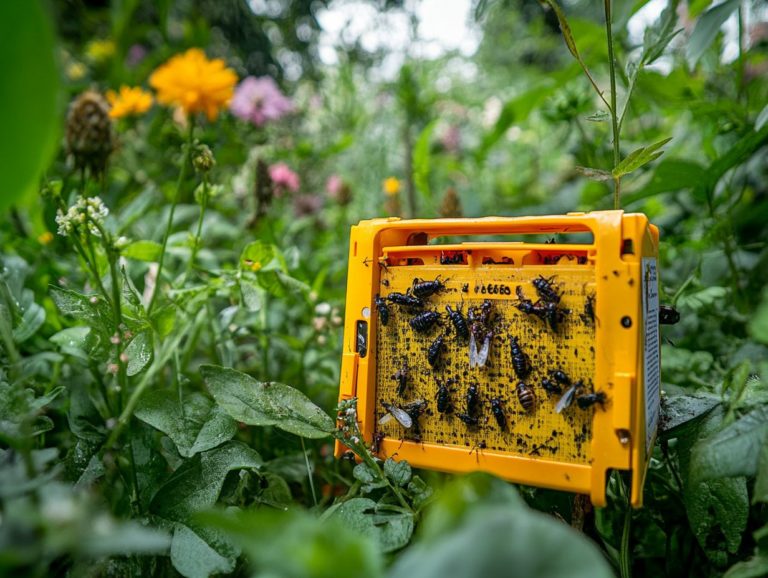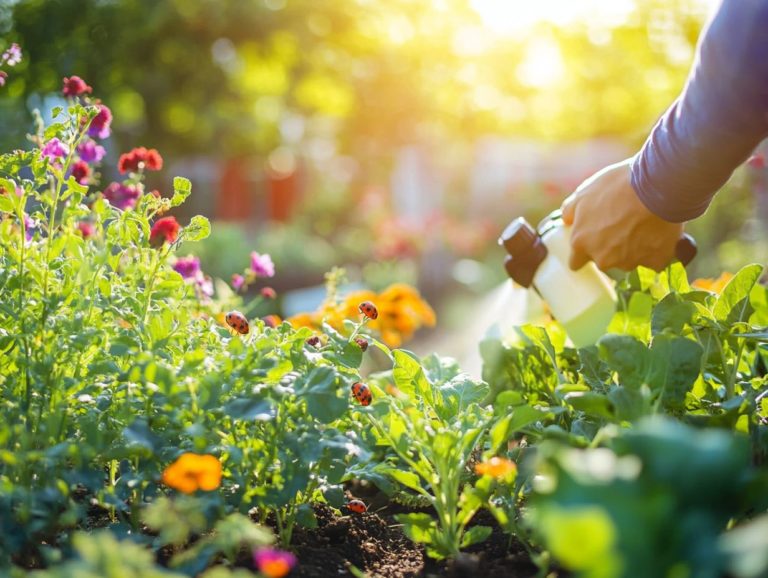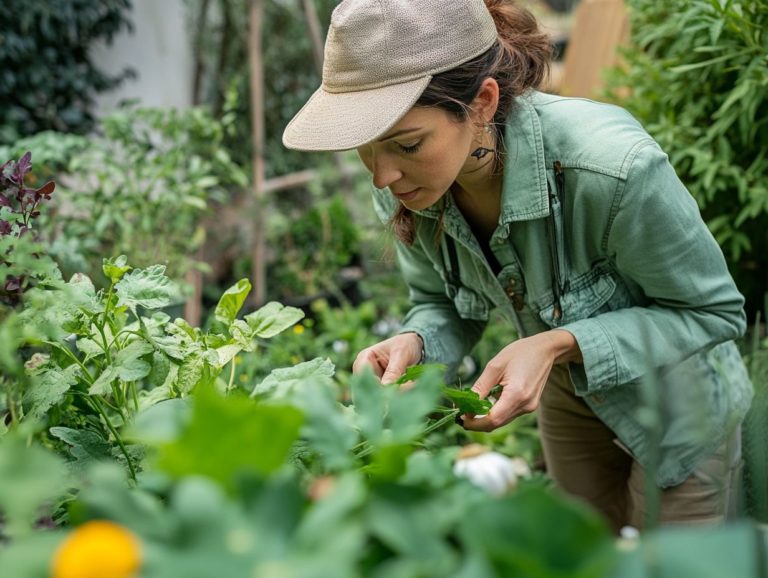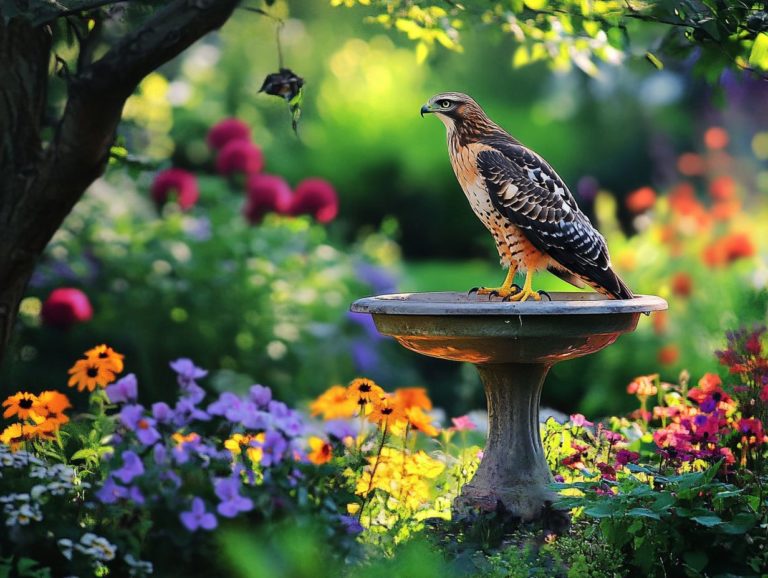5 Common Mistakes in Organic Pest Control
Navigating the realm of organic pest control can be quite the challenge, particularly with the common pitfalls that may impede your success.
Let s explore five common mistakes that could sabotage your organic pest control efforts, such as over-relying on chemicals and misidentifying pests. This article emphasizes the significance of preventative measures and the environmental impact of your choices.
By grasping these missteps and discovering effective strategies, you ll be well-prepared to cultivate a pest-free, eco-friendly environment.
Embark on this journey with us to uncover the essentials of successful organic pest management.
Contents
- Key Takeaways:
- 1. Using Chemicals Instead of Natural Methods
- 2. Not Identifying the Pest Correctly
- 3. Not Taking Preventative Measures
- 4. Overusing or Misusing Natural Pest Control Methods
- 5. Not Considering the Environmental Impact
- What Is Organic Pest Control and Why Is It Important?
- What Are Some Environmentally-Friendly Pest Control Options?
- What Are Some Common Myths About Organic Pest Control?
- How Can One Transition to Using Organic Pest Control Methods?
- Frequently Asked Questions
Key Takeaways:
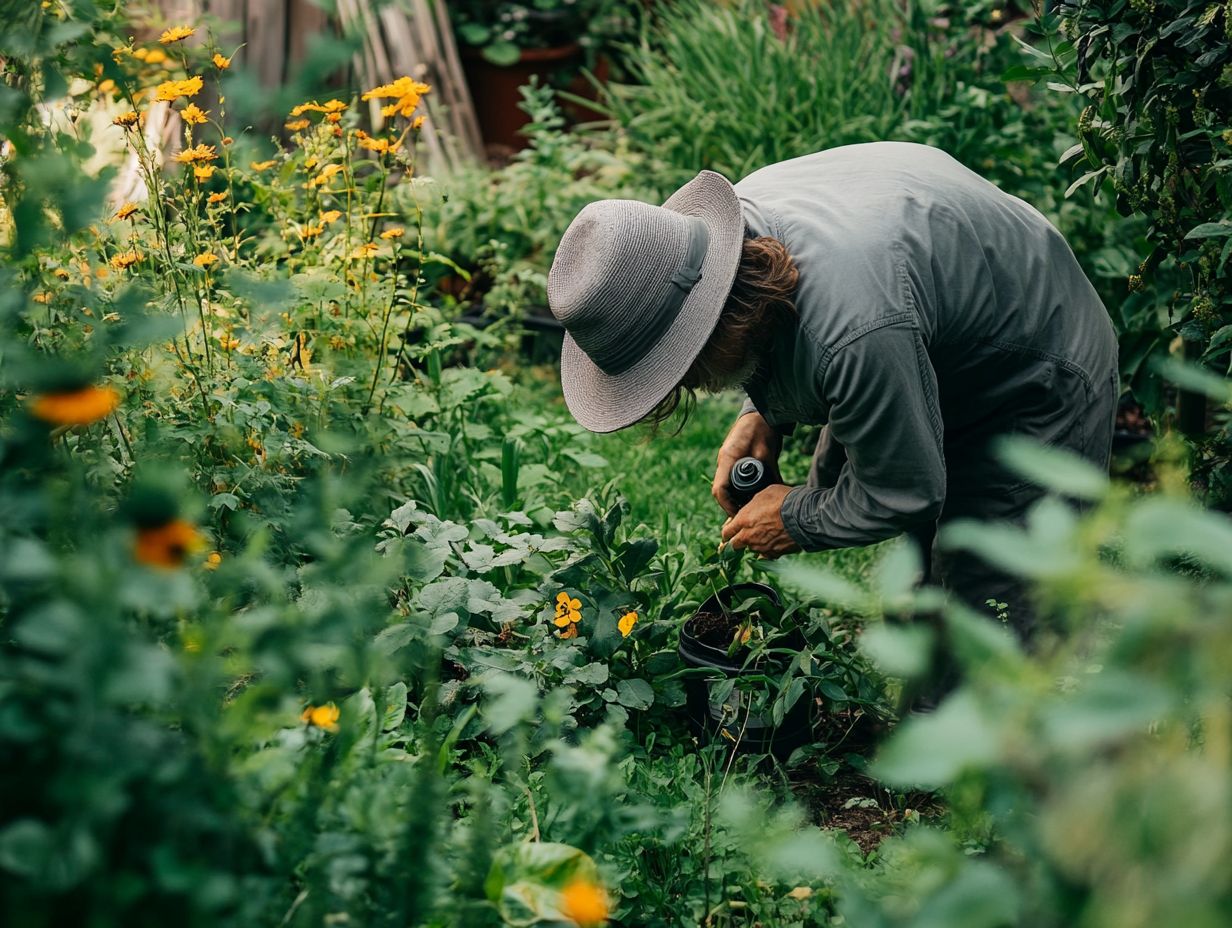
- Using chemicals for pest control defeats the purpose of going organic. Seek natural methods first.
- Properly identifying the pest is crucial to choosing the most effective organic pest control method.
- Taking preventative measures such as proper sanitation and pest-proofing can greatly reduce the need for pest control.
1. Using Chemicals Instead of Natural Methods
In the world of pest management, many gardeners often default to chemical pesticides. This oversight causes them to miss out on natural pest control methods that can be beneficial for their gardens.
By embracing these alternatives, you can cultivate a healthier balance in your garden ecosystem while minimizing harm to beneficial insects and the environment.
Chemical pesticides can lead to several detrimental effects, including the rise of pesticide-resistant pests and the decline of essential pollinator species. Choosing organic solutions enhances ecological health and nurtures a thriving habitat for beneficial insects.
By utilizing natural pesticides like neem oil and spinosad, you actively support biodiversity while effectively addressing pest issues. Incorporating strategies like companion planting and integrated pest management increases your garden s resilience, fostering a sustainable environment that flourishes without harsh chemicals.
2. Not Identifying the Pest Correctly
One of the most common mistakes gardeners make is failing to identify garden pests accurately. This can lead to ineffective pest control methods and may inadvertently harm beneficial insects vital for your garden’s ecosystem. To avoid this, consider exploring the top 5 pest control techniques for vegetables.
Accurate pest identification is crucial because different pests require tailored management strategies. For instance, if you encounter aphids those tiny nuisances that can wreak havoc on your plants attracting their natural predators, like ladybugs, is an effective countermeasure.
Understanding these relationships is essential; without proper identification, you might inadvertently harm ladybugs while treating aphid infestations. This is where garden consultancy services can help, offering invaluable expertise in recognizing specific pest species and guiding you on sustainable management techniques.
Early detection is equally important for your gardening success. Regularly inspect your plants for unusual signs like discolored leaves or webbing. If you catch these issues early, you ll be better equipped to manage them effectively and maintain the health of your garden.
3. Not Taking Preventative Measures
Neglecting preventative measures against seasonal pests can leave your garden exposed. Thriving plants require proactive care and vigilance to uphold their resilience against pest issues.
To protect your green sanctuary, it s essential to select native plants that are well-suited to the local climate. These varieties typically require less water and show greater resistance to local pests.
Understanding the specific needs of each plant species significantly reduces vulnerabilities. Proper spacing, optimal sunlight exposure, and effective watering techniques are vital for their overall health.
Incorporating insect-repellent plants like marigolds and lavender creates a natural barrier against harmful insects. By fostering a chemical-free zone, you encourage populations of beneficial insects like ladybugs and bees, which play a crucial role in natural pest control and promote biodiversity, enriching the ecosystem within your garden.
4. Overusing or Misusing Natural Pest Control Methods
While natural pesticides like neem oil and spinosad can be excellent allies in your organic gardening efforts, overusing or misusing these methods can backfire. This diminishes their effectiveness and disrupts the delicate balance of the ecosystem.
It s essential for you to apply these products with a keen eye on timing, dosage, and environmental factors. For example, using neem oil during the early morning or late evening can significantly reduce the risk to beneficial pollinators, like bees, which are most active during the daytime.
You can enhance your pest control strategy by integrating these pesticides with pest management techniques such as introducing beneficial insects like ladybugs or lacewings. By following these practices, you can cultivate a thriving garden that supports both your plants and the helpful organisms within it, embracing a holistic approach to pest management.
5. Not Considering the Environmental Impact
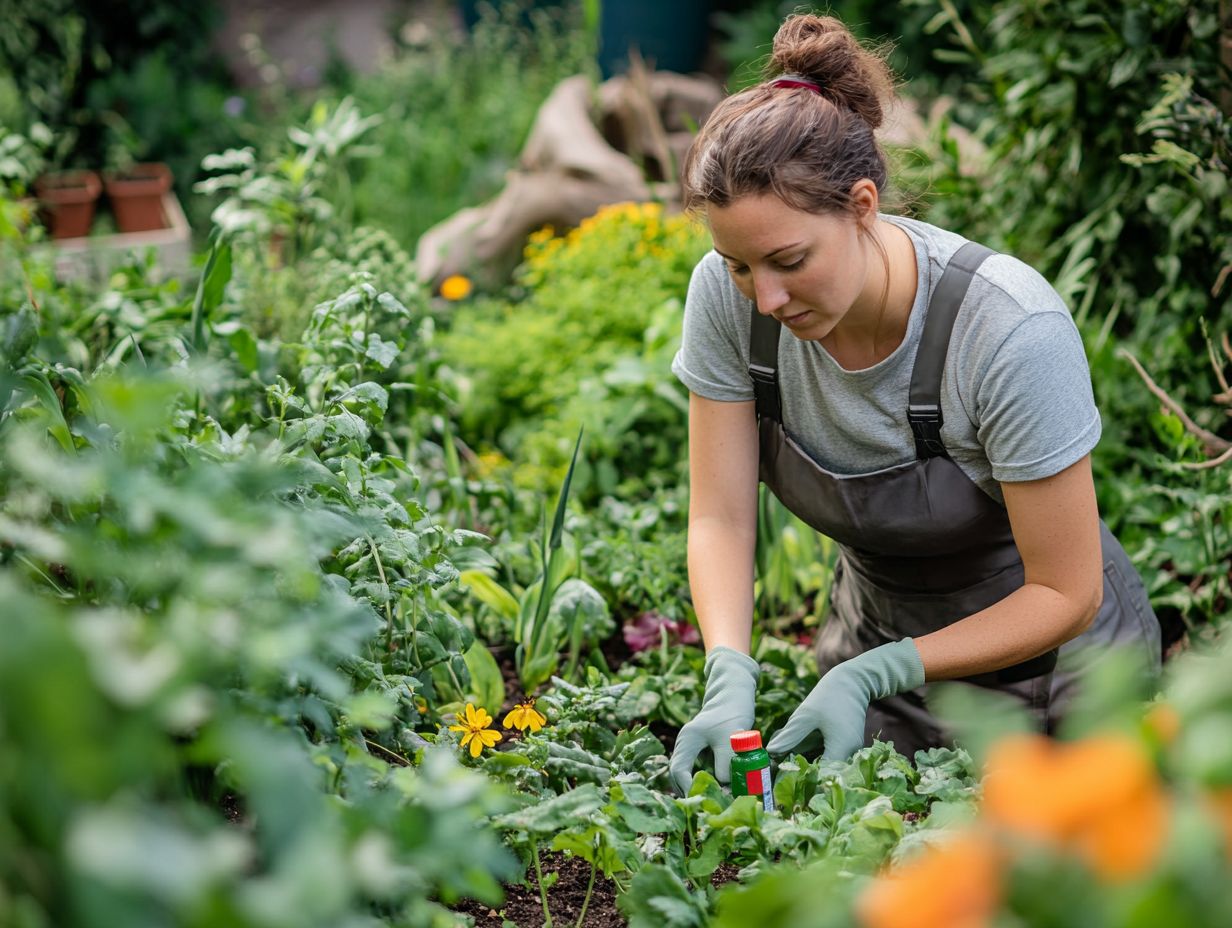
In today s world, neglecting the environmental impact of pest control methods can worsen issues like pesticide residues and threaten biodiversity. It’s crucial for gardeners like you to consider sustainable living.
While chemical pesticides might appear to offer a quick solution to pest issues, their long-term effects can be harmful to local wildlife and vital pollinators, such as bees and butterflies. These harsh chemicals can lead to soil degradation and water contamination, further disrupting natural habitats.
Eco-friendly alternatives not only provide a safer option for the environment but also promote the flourishing of helpful insects. By adopting organic gardening practices and focusing on chemical-free solutions, you can play a significant role in nurturing healthier ecosystems and fostering a balanced environment for generations to come!
What Is Organic Pest Control and Why Is It Important?
Organic pest control encompasses a range of strategies designed to manage pests without resorting to harmful synthetic chemicals. Instead, it emphasizes maintaining the roles of various organisms within the ecosystem and adopting a holistic approach that prioritizes environmental safety and the health of beneficial insects over dependence on commercial products.
This methodology enhances the vitality of your garden and nurtures biodiversity, playing a vital role in sustaining ecological balance. By employing practices such as companion planting growing compatible plants together to naturally deter pests and integrating pest management techniques that consider the life cycles of pests and their natural predators, you can effectively minimize damage to organisms that aren t pests.
Embracing organic pest control ultimately fosters a vibrant ecosystem, encouraging the presence of beneficial species while reducing reliance on potentially harmful chemicals that can disrupt natural habitats.
What Are the Benefits of Using Organic Pest Control?
Using organic pest control methods offers you a multitude of benefits, from fostering a harmonious balance in your garden to enhancing biodiversity. It promotes a sustainable living environment that nurtures both plant and animal life.
This approach improves plant health by employing natural solutions that safeguard your crops without the harsh side effects associated with synthetic chemicals. Not only does this reduce chemical residues in your food, but it also cultivates an ecosystem where helpful insects can flourish.
Research indicates that gardens utilizing organic pest control are more resilient, boasting thriving communities of pollinators like bees and butterflies. Experts, such as Elizabeth Waddington from the University of St Andrews, highlight that these methods enhance individual gardens and significantly contribute to the preservation of local wildlife habitats.
By making informed choices, you can significantly improve the health of our environment!
How Can One Properly Identify a Pest?
Properly identifying a pest is important for effective pest management. It gives you the power to select the right control methods that target harmful species while preserving the beneficial insects crucial to your garden’s ecosystem.
To kick off the identification process, take a moment to closely observe the behavior of the suspected pests. Pay attention to where they congregate whether it s specific plants or particular corners of your garden as these details can provide valuable insights.
Recognizing signs of damage, such as holes in leaves, frass (the droppings of insects), or wilted plants, will help you distinguish between true pests and harmless visitors. Leverage resources like pest identification apps or online databases to streamline the process, allowing for quick referencing during your observations.
It is also important to understand the difference between garden pests and beneficial insects. Insects like ladybugs and bees are not just cute; they help with pollination and natural pest control, promoting a balanced and thriving garden environment.
What Are Some Effective Natural Pest Control Methods and Products?
Effective natural pest control methods include using organic alternatives like natural pesticides, enlisting beneficial insects such as ladybugs and praying mantises, and adopting simple techniques like handpicking pests and setting up pest traps.
These strategies not only cultivate a healthier garden but also safeguard the surrounding ecosystem. For instance, ladybugs have a well-deserved reputation for their appetite for aphids, helping to diminish these harmful pests without resorting to harsh chemicals.
Similarly, praying mantises are adept at managing a variety of pests, making them invaluable allies in your pest control efforts. However, while pest traps can be a practical solution for monitoring and controlling pest populations, they might inadvertently capture beneficial insects as well.
This is where an integrated pest management approach comes into play. Combining various methods tailored to address specific pest problems enhances efficiency while minimizing collateral damage to non-target species.
What Are Some Preventative Measures to Take Against Pests?
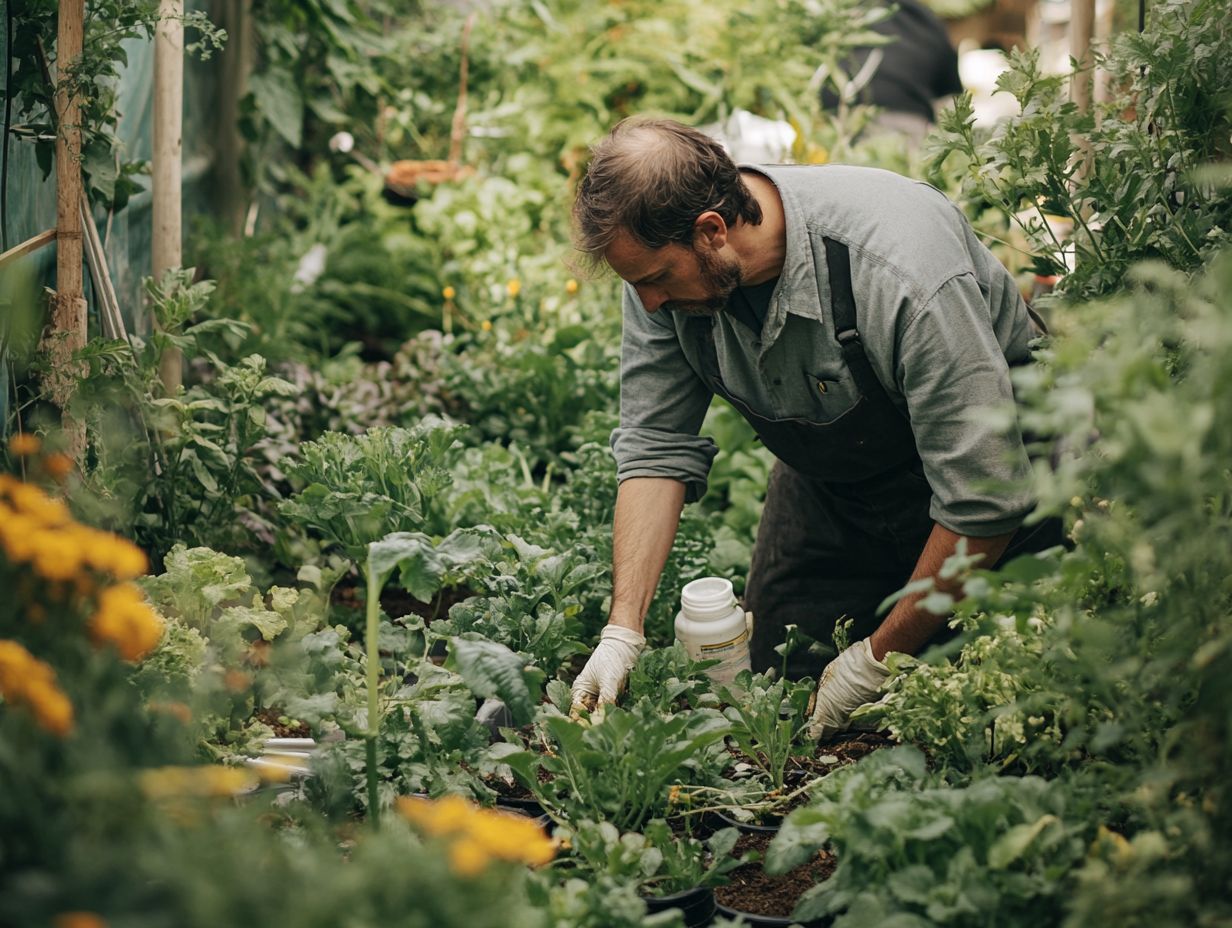
Implementing preventative measures against potential pests is important for maintaining the health of your plants. This involves practices such as companion planting (growing different plants together for mutual benefits), rotating crops, and selecting native plants that thrive in your local environment while creating a chemical-free zone.
By strategically positioning certain plants next to each other, you can enhance their growth while simultaneously deterring harmful insects. This approach not only promotes biodiversity but also attracts beneficial creatures like ladybugs and lacewings, which play a crucial role in keeping pest populations in check.
Regularly monitoring your plants for early signs of trouble like discolored leaves or unusual spots can significantly reduce damage and boost your yield. Understanding the specific pests that tend to show up during different seasons gives you the power to take timely action.
Start identifying pests today to ensure your garden remains a vibrant and thriving ecosystem and contributes to overall ecosystem balance.
How Can One Safely and Effectively Use Natural Pest Control Methods?
To effectively and safely harness natural pest control methods, you should familiarize yourself with the proper application of products like neem oil and spinosad, all while keeping environmental safety and the well-being of beneficial insects in mind.
Timing is critical; applying these products in the early morning or late evening can significantly lower the risk of harming pollinators. It s vital to follow the dosage recommendations on the product label, as over-application can result in unintended harm to your plants and surrounding wildlife.
Utilizing techniques such as spot spraying or employing a finer mist can help you focus on specific areas while minimizing drift. By carefully reading labels, you not only ensure correct usage but also gain insight into necessary precautions.
Ultimately, promoting an eco-friendly approach that safeguards both your crops and the delicate balance of the garden ecosystem is key. Let s dive into natural pest control!
What Are Some Environmentally-Friendly Pest Control Options?
Environmentally-friendly pest control options, such as organic pesticides and pest traps, empower you to manage pest issues sustainably while minimizing collateral damage to non-target species. By embracing these methods, you not only protect your plants but also contribute to a healthier ecosystem through chemical-free gardening.
Organic pesticides, sourced from natural materials, provide a gentler alternative to harmful synthetic chemicals. They effectively disrupt pest life cycles without harming beneficial insects like bees and butterflies.
Pest traps use physical methods to capture unwelcome visitors, allowing other wildlife to flourish unobstructed.
Integrating companion planting and attracting predator insects are proactive strategies that enhance biodiversity in your garden. These sustainable practices cultivate a balanced environment and reduce the risk of chemicals washing away into water sources. Ultimately, they foster a more resilient garden ecosystem, proving that pest control can be both effective and eco-conscious.
What Are Some Common Myths About Organic Pest Control?
Misconceptions about organic pest control abound, and these myths can steer you away from effective strategies. By exploring the top 10 tips for organic pest management, you can prioritize environmental impact and ecosystem health.
One common belief is that organic solutions are inherently less effective than their chemical counterparts. However, research consistently shows that organic methods effectively manage pest populations while supporting beneficial insects and enhancing soil health.
This approach often incorporates natural predators, companion planting, and diverse crop rotations, all of which work together to create a balanced ecosystem.
Unlike synthetic pesticides, organic alternatives are generally safer for both humans and wildlife. This allows your garden to thrive vibrantly without the health risks or environmental degradation commonly associated with harmful synthetic pest solutions.
How Can One Transition to Using Organic Pest Control Methods?
Switching to organic pest control is an exciting opportunity to transform your gardening! This shift gives you the power to cultivate a healthier and more resilient ecosystem.
To embark on this rewarding journey, begin by assessing your current pest management practices. Identify areas ripe for a more organic approach by examining the pesticides you’re currently using and understanding their long-term effects on both your plants and the surrounding environment.
Next, immerse yourself in the wealth of knowledge surrounding organic alternatives. Numerous resources, including books, online articles, and local gardening clubs offer invaluable insights into natural pest deterrents, effective traps for common garden pests, and beneficial insects.
By gradually incorporating these new methods into your gardening routine, you ll facilitate a smoother transition that ensures both your garden and you flourish. This approach ultimately leads to a more sustainable and productive gardening experience over time.
Frequently Asked Questions
Avoid These 5 Mistakes in Organic Pest Control!
1. Not properly identifying the pest: Misidentifying the pest can lead to using the wrong methods, which wastes your time and effort. For effective strategies, consider these 5 simple pest control hacks for gardeners.
2. Using ineffective methods: Many rely on unreliable advice or untested remedies. It s crucial to research and use proven methods.
3. Keeping your garden clean: Regular weeding and removing plant debris are essential. Neglecting these tasks can make pest control harder.
4. Overlooking preventative measures: Many wait until pests have already infested their plants to act. Instead, consider learning about organic pest control: myths vs. facts and don’t wait—be proactive!
5. Finding the right balance: Using too much of a natural remedy can harm your plants. A little goes a long way, so find that sweet spot by learning about the 5 essential attributes of effective pest control.
How Can I Identify Pests in My Garden?
Inspect your plants closely for signs of damage or pests. Research common pests in your area or ask a local expert for help.
Are Homemade Remedies Always Effective?
No, not all homemade remedies work. Do thorough research and stick to proven methods.
Good Hygiene Practices for Pest Prevention
Regular weeding and maintaining a clean garden are key. These practices make your garden less appealing to pests.
Proactive vs. Reactive Pest Control
Being proactive is always better. Waiting can result in irreversible damage.
How to Balance Natural Remedies
Follow recommended dosages when using natural remedies. Start small with organic alternatives like neem oil, and consult an expert if needed.

